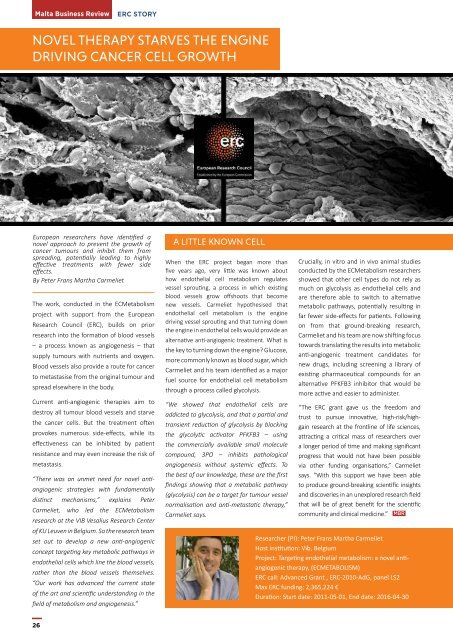MBR_Issue_28 -February 2017
You also want an ePaper? Increase the reach of your titles
YUMPU automatically turns print PDFs into web optimized ePapers that Google loves.
Malta Business Review<br />
ERC STORY<br />
NOVEL THERAPY STARVES THE ENGINE<br />
DRIVING CANCER CELL GROWTH<br />
European researchers have identified a<br />
novel approach to prevent the growth of<br />
cancer tumours and inhibit them from<br />
spreading, potentially leading to highly<br />
effective treatments with fewer side<br />
effects.<br />
By Peter Frans Martha Carmeliet<br />
The work, conducted in the ECMetabolism<br />
project with support from the European<br />
Research Council (ERC), builds on prior<br />
research into the formation of blood vessels<br />
– a process known as angiogenesis – that<br />
supply tumours with nutrients and oxygen.<br />
Blood vessels also provide a route for cancer<br />
to metastasise from the original tumour and<br />
spread elsewhere in the body.<br />
Current anti-angiogenic therapies aim to<br />
destroy all tumour blood vessels and starve<br />
the cancer cells. But the treatment often<br />
provokes numerous side-effects, while its<br />
effectiveness can be inhibited by patient<br />
resistance and may even increase the risk of<br />
metastasis.<br />
“There was an unmet need for novel antiangiogenic<br />
strategies with fundamentally<br />
distinct mechanisms,” explains Peter<br />
Carmeliet, who led the ECMetabolism<br />
research at the VIB Vesalius Research Center<br />
of KU Leuven in Belgium. So the research team<br />
set out to develop a new anti-angiogenic<br />
concept targeting key metabolic pathways in<br />
endothelial cells which line the blood vessels,<br />
rather than the blood vessels themselves.<br />
“Our work has advanced the current state<br />
of the art and scientific understanding in the<br />
field of metabolism and angiogenesis.”<br />
A LITTLE KNOWN CELL<br />
When the ERC project began more than<br />
five years ago, very little was known about<br />
how endothelial cell metabolism regulates<br />
vessel sprouting, a process in which existing<br />
blood vessels grow offshoots that become<br />
new vessels. Carmeliet hypothesised that<br />
endothelial cell metabolism is the engine<br />
driving vessel sprouting and that turning down<br />
the engine in endothelial cells would provide an<br />
alternative anti-angiogenic treatment. What is<br />
the key to turning down the engine? Glucose,<br />
more commonly known as blood sugar, which<br />
Carmeliet and his team identified as a major<br />
fuel source for endothelial cell metabolism<br />
through a process called glycolysis.<br />
“We showed that endothelial cells are<br />
addicted to glycolysis, and that a partial and<br />
transient reduction of glycolysis by blocking<br />
the glycolytic activator PFKFB3 – using<br />
the commercially available small molecule<br />
compound, 3PO – inhibits pathological<br />
angiogenesis without systemic effects. To<br />
the best of our knowledge, these are the first<br />
findings showing that a metabolic pathway<br />
(glycolysis) can be a target for tumour vessel<br />
normalisation and anti-metastatic therapy,”<br />
Carmeliet says.<br />
Crucially, in vitro and in vivo animal studies<br />
conducted by the ECMetabolism researchers<br />
showed that other cell types do not rely as<br />
much on glycolysis as endothelial cells and<br />
are therefore able to switch to alternative<br />
metabolic pathways, potentially resulting in<br />
far fewer side-effects for patients. Following<br />
on from that ground-breaking research,<br />
Carmeliet and his team are now shifting focus<br />
towards translating the results into metabolic<br />
anti-angiogenic treatment candidates for<br />
new drugs, including screening a library of<br />
existing pharmaceutical compounds for an<br />
alternative PFKFB3 inhibitor that would be<br />
more active and easier to administer.<br />
“The ERC grant gave us the freedom and<br />
trust to pursue innovative, high-risk/highgain<br />
research at the frontline of life sciences,<br />
attracting a critical mass of researchers over<br />
a longer period of time and making significant<br />
progress that would not have been possible<br />
via other funding organisations,” Carmeliet<br />
says. “With this support we have been able<br />
to produce ground-breaking scientific insights<br />
and discoveries in an unexplored research field<br />
that will be of great benefit for the scientific<br />
community and clinical medicine.” <strong>MBR</strong><br />
Researcher (PI): Peter Frans Martha Carmeliet<br />
Host institution: Vib, Belgium<br />
Project: Targeting endothelial metabolism: a novel antiangiogenic<br />
therapy, (ECMETABOLISM)<br />
ERC call: Advanced Grant , ERC-2010-AdG, panel LS2<br />
Max ERC funding: 2,365,224 €<br />
Duration: Start date: 2011-05-01, End date: 2016-04-30<br />
We are flexible<br />
to your needs<br />
NEW ON THE MARKET<br />
WE HAVE PROPERTIES IN:<br />
• GUDJA • MARSASKALA • SAN PAWL • QAWRA<br />
• BIRKIRKARA • BIRZEBBUGIA • GHARGHUR • IBRAGG<br />
• SWIEQI • ST VENERA • MGARR • MOSTA • MELLIEHA<br />
• QRENDI • QORMI • ZURRIEQ •XGHAJRA<br />
1<strong>28</strong>, Triq San Bartolomew, Qormi QRM 2184 E: info@tadernis.com M: 9986 0983<br />
www.tadernis.com<br />
26

















